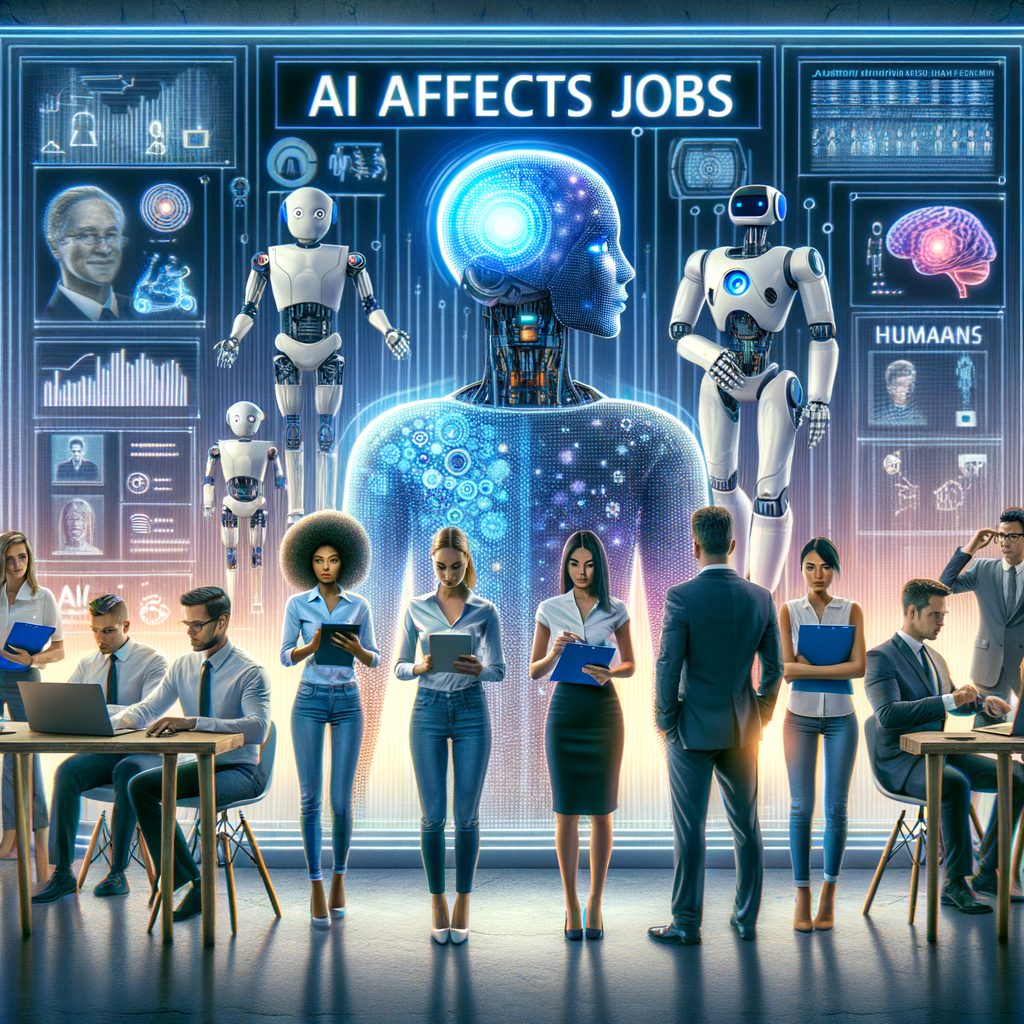The buzz around AI impact on jobs is impossible to ignore. It’s sparking questions and even fears. This technology feels different. It’s not just about machines on factory floors anymore — it’s impacting areas we once thought were only for humans. Let’s break down this complex topic, separating hype from reality.
How AI Is Changing the Job Landscape: From Automation to Augmentation
AI is entering workplaces in a few key ways: taking over tasks humans do, supporting human jobs, and creating completely new roles. As AI technology rapidly evolves, its presence in the job market is becoming increasingly prominent.
The Automation Wave: Jobs Most Impacted
We’ve all seen the headlines: “Robots are coming for our jobs.” While the future isn’t about robot overlords (at least, we hope not.), some jobs are more vulnerable to automation technology than others. Think repetitive, data-heavy tasks.
A report by Goldman Sachs suggests that roles in finance, media, legal, and customer service are particularly susceptible. Imagine AI handling bank transactions, drafting basic legal documents, or responding to customer queries.
Even manufacturing, a sector long utilizing automation, faces further shifts as artificial intelligence is predicted to further change how work is done. Forbes highlights a prediction that AI could replace as many as two million manufacturing workers by 2025.
AI as a Helping Hand: Augmenting Human Potential
Now, here’s the flip side. AI’s impact on jobs isn’t just about displacement. In many cases, AI will work alongside humans, boosting efficiency and letting us focus on tasks requiring uniquely human traits. AI tools can help people perform tasks more efficiently and accurately.
Think about a doctor diagnosing patients. AI can analyze medical images, scanning for anomalies far faster than a human could. But, it’s the doctor who ultimately interprets the findings, considers patient history, and delivers the diagnosis with empathy and understanding. The doctor’s job changes and, arguably, becomes more fulfilling.
The same applies to teachers, artists, writers – those whose work relies on emotional intelligence and creative problem-solving. These highly emotional jobs are likely to be less impacted by AI.
The Rise of New Roles: The AI-Powered Workforce
Just as the internet created careers we never imagined, so too will AI. We’re already seeing a demand for professionals who can build, train, and manage AI systems. New AI jobs are emerging as the field continues to grow.
AI prompt engineers refine the interactions we have with these tools. AI ethicists grapple with the moral implications of intelligent systems. It’s a whole new world of work we’re just starting to understand.
Preparing for the Shift: How Workers Can Thrive
AI’s impact on jobs is happening, that much is clear. So, how do individuals navigate this new landscape and set themselves up for success? Workers can adapt to the changing job market by focusing on skills that are in high demand.
Embrace Lifelong Learning
The most important asset in an AI-driven world is adaptability. Technology is evolving at lightning speed, meaning we need to be in constant learning mode. Online courses, workshops, even just staying curious about AI advancements — it all counts. Workers can position themselves for success in the age of AI.
Hone those Human Skills
While robots might excel at processing data, soft skills like communication, collaboration, critical thinking, and empathy become even more valuable. These skills will set you apart. This is because AI isn’t great at replicating these qualities (at least, not yet.).
Embrace a Growth Mindset
This change can feel daunting. However, viewing AI as a tool to enhance your existing skills—not replace you entirely—can make all the difference. Those who are open to learning and adapting will be best positioned to thrive in this evolving landscape.
The Skills You’ll Need to Succeed
As AI becomes more integrated into workplaces, certain skills are rising to the top. Consider focusing on these areas to future-proof your career. Adaptability and a willingness to embrace new technologies are essential.
1. STEM Skills
STEM stands for science, technology, engineering, and mathematics. Expertise in these fields is increasingly sought-after. Studies show companies investing heavily in AI prioritize STEM-educated employees. This trend makes sense when you think about it — these fields underpin the very technology driving this AI revolution.
2. Data Literacy
The ability to understand, interpret, and work with data is crucial. AI thrives on data, so those who can analyze data sets, draw meaningful insights, and communicate those findings effectively will have a significant advantage. The demand for data analysis skills is expected to continue to grow.
3. Critical Thinking and Problem Solving
Even with AI, complex problems will still require human ingenuity. Employers will seek those who can approach challenges from multiple angles, think creatively, and come up with innovative solutions. As AI takes over routine tasks, the ability to think critically and solve problems will be highly valued.
Navigating the Uncertainty: What the Future Holds
Predicting the long-term AI impact on jobs is difficult. We’re in uncharted territory. Some are sounding alarm bells, fearing widespread unemployment. Others envision an era of enhanced productivity, job satisfaction, and a better work-life balance. Who’s right? The increasing adoption of AI is transforming the way we work, creating new opportunities and challenges.
The truth likely lies somewhere in the middle. This much is clear: large-scale changes require proactive responses. Policymakers will grapple with regulating AI ethically and minimizing job displacement. Educational institutions will adapt curricula to equip students with the skills in highest demand. The potential impact of AI on jobs is significant, and it is essential to approach this transformative period with a balance of optimism and caution.
For individuals, it’s about being informed and prepared. Stay informed on these changes, proactively upgrade your skillset, and never stop learning. This approach will put you in a stronger position, whatever the future holds. Embracing lifelong learning and developing in-demand skills will be crucial for individuals to stay competitive.
FAQs about AI impact on jobs
What is the impact of AI on jobs?
The impact of AI on jobs is multi-faceted. It has the potential to automate specific roles, especially those involving repetitive tasks, which may lead to job displacement. At the same time, AI will create new job opportunities, demanding specialized skills in fields like AI development, data science, and machine learning. Additionally, it’s poised to reshape how many jobs are performed by augmenting human capabilities, boosting efficiency and productivity across industries. For example, McKinsey predicts that up to 45 percent of work activities can be automated.
What are the impacts of AI on the workplace?
Beyond the direct impact of AI on jobs themselves, the entire workplace will see significant transformation. National data show that businesses using AI tools have increased, and the Census Bureau expects continued growth. AI is likely to bring greater process automation, increase data-driven decision-making, and reshape workplace collaboration. The skills needed will also shift, with a greater emphasis on continuous learning, problem-solving, and creativity to complement AI capabilities. It also presents ethical considerations related to bias, fairness, and worker privacy.
What jobs will AI replace by 2030?
It’s nearly impossible to give an exhaustive list of jobs AI *will* definitively replace by 2030. AI’s capabilities are continuously evolving. But, if current trends are any indication, McKinsey research suggests that up to 14% of people may need to switch careers by that year due to various technological advancements.
Is AI going to replace jobs?
While headlines often focus on AI as a “job killer,” the full story is much more nuanced. Experts believe it will both replace certain existing jobs and create new ones, leading to a significant restructuring of the labor market, with a high demand for people that possess specialized skills needed to work alongside or in conjunction with AI. So, instead of thinking “replace,” perhaps a better question is “how will AI reshape jobs?”
Conclusion: Adapting to the AI-Driven Job Transformation
AI’s impact on jobs is a topic of significant discussion, with viewpoints ranging from apocalyptic warnings about job losses to optimistic projections of an economic boom. One thing is undeniable: AI is here to stay. Its influence will continue to shape the world of work as we know it.






